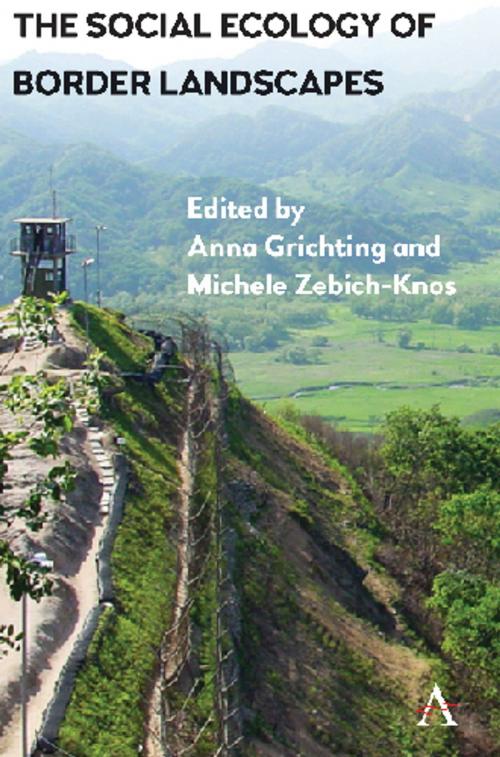The Social Ecology of Border Landscapes
Nonfiction, Social & Cultural Studies, Social Science, Human Geography, Political Science, Government, Public Policy, Science & Nature, Nature| Author: | ISBN: | 9781783086719 | |
| Publisher: | Anthem Press | Publication: | May 2, 2017 |
| Imprint: | Anthem Press | Language: | English |
| Author: | |
| ISBN: | 9781783086719 |
| Publisher: | Anthem Press |
| Publication: | May 2, 2017 |
| Imprint: | Anthem Press |
| Language: | English |
Social Ecology is an emerging concept situated in the field of critical social theory and new integrative sciences that addresses the complex and interrelated relationship between nature and society, offering a perspective on how environmental issues are embedded in a social context. Border landscapes are loosely defined as interstitial spaces between territories or societies, in conflict or in competition, with fixed or moving boundaries. Scholars involved in Critical Border Studies employ interdisciplinary approaches to the study of borders, often charting new territories (scapes) to analyze and intervene in the complex geography of border zones. Adding to the flourishing literature and rising interest in borders, this volume on the social ecology of border landscapes examines case studies and examples of projects that highlight such borders within a social-ecological framework. Social Ecology as a critical social theory was originally founded by Murray Bookchin as a critique of social, political and anti-ecological trends. Other proponents of a social-ecological approach (such as Samantha Stone-Jovicich, and Michael Fabinyi, Louisa Evans, and Simon J Foale) use a less idealistic approach to social ecology than that of Bookchin, urging us to consider the important role of space and its bio-geophysical characteristics that spur both ecological and social change. This attention to locally-defined spaces—be it along the Israeli wall, former Berlin wall or the Korean Demilitarized Zone— yields important human-environmental interactions and consequences that form the basis for a social ecological interpretation of environmental adaptation and change. Social ecology as a framework has expanded to include Social-Ecological Systems (SES), which emerged from critical social and resilience theories as a means of addressing the adaptive and complex structures and processes of the social and natural world.
This edited volume is a collection of essays from a wide range of disciplines that address social-ecological systems, namely in the marginal spaces, landscapes and territorial interfaces of border zones. From theoretical and conceptual presentations on social ecology and its related actions or agency, to case studies and concrete projects and initiatives, the book uncovers a thread of contemporary thought and action on the important emerging field of border ecologies within the larger realm of critical border studies. The authors are worldwide scholars and practitioners from the fields of politics, ecological and environmental sciences, social sciences, geography, and urban and landscape planning. The publication explores how social agency (i.e. social action) can activate ecological processes and systems, creating new sustainable landscapes across tangible and intangible territorial rifts. To overcome the negative impacts of border creation and/or behaviors, the tangible and territorial, as well as the intangible social and cognitive manifestations of the rift must be addressed.
Social Ecology is an emerging concept situated in the field of critical social theory and new integrative sciences that addresses the complex and interrelated relationship between nature and society, offering a perspective on how environmental issues are embedded in a social context. Border landscapes are loosely defined as interstitial spaces between territories or societies, in conflict or in competition, with fixed or moving boundaries. Scholars involved in Critical Border Studies employ interdisciplinary approaches to the study of borders, often charting new territories (scapes) to analyze and intervene in the complex geography of border zones. Adding to the flourishing literature and rising interest in borders, this volume on the social ecology of border landscapes examines case studies and examples of projects that highlight such borders within a social-ecological framework. Social Ecology as a critical social theory was originally founded by Murray Bookchin as a critique of social, political and anti-ecological trends. Other proponents of a social-ecological approach (such as Samantha Stone-Jovicich, and Michael Fabinyi, Louisa Evans, and Simon J Foale) use a less idealistic approach to social ecology than that of Bookchin, urging us to consider the important role of space and its bio-geophysical characteristics that spur both ecological and social change. This attention to locally-defined spaces—be it along the Israeli wall, former Berlin wall or the Korean Demilitarized Zone— yields important human-environmental interactions and consequences that form the basis for a social ecological interpretation of environmental adaptation and change. Social ecology as a framework has expanded to include Social-Ecological Systems (SES), which emerged from critical social and resilience theories as a means of addressing the adaptive and complex structures and processes of the social and natural world.
This edited volume is a collection of essays from a wide range of disciplines that address social-ecological systems, namely in the marginal spaces, landscapes and territorial interfaces of border zones. From theoretical and conceptual presentations on social ecology and its related actions or agency, to case studies and concrete projects and initiatives, the book uncovers a thread of contemporary thought and action on the important emerging field of border ecologies within the larger realm of critical border studies. The authors are worldwide scholars and practitioners from the fields of politics, ecological and environmental sciences, social sciences, geography, and urban and landscape planning. The publication explores how social agency (i.e. social action) can activate ecological processes and systems, creating new sustainable landscapes across tangible and intangible territorial rifts. To overcome the negative impacts of border creation and/or behaviors, the tangible and territorial, as well as the intangible social and cognitive manifestations of the rift must be addressed.















